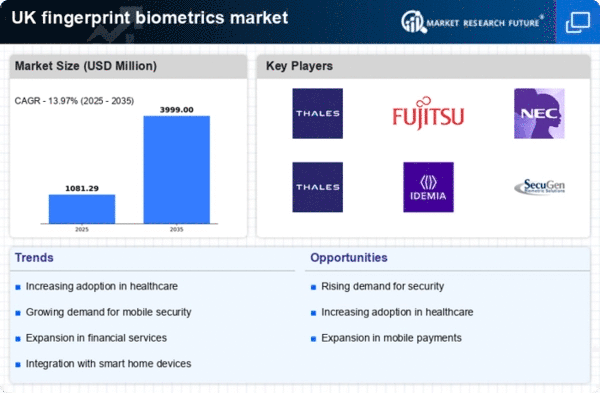Rising Security Concerns
The fingerprint biometrics market is experiencing a surge in demand due to escalating security concerns across various sectors in the UK. With increasing incidents of identity theft and cybercrime, organizations are prioritizing robust security measures. The biometric authentication method, particularly fingerprint recognition, offers a reliable solution to mitigate these risks. In 2025, the market is projected to grow at a CAGR of approximately 15%, driven by the need for enhanced security protocols. Businesses are investing in fingerprint biometrics to protect sensitive data and ensure secure access to facilities. This trend is particularly evident in sectors such as banking, healthcare, and government, where safeguarding personal information is paramount. As security threats evolve, the fingerprint biometrics market is likely to expand further, providing innovative solutions to meet the demands of a security-conscious society.
Technological Advancements
Technological advancements play a pivotal role in shaping the fingerprint biometrics market. Innovations in sensor technology, algorithms, and data processing capabilities are enhancing the accuracy and speed of fingerprint recognition systems. In the UK, the integration of artificial intelligence and machine learning into biometric systems is revolutionizing the industry. These advancements not only improve the user experience but also increase the reliability of fingerprint authentication. The market is witnessing a shift towards multi-modal biometric systems, which combine fingerprint recognition with other biometric modalities for enhanced security. As technology continues to evolve, the fingerprint biometrics market is expected to see a significant increase in adoption rates, particularly in sectors that require high-security measures. By 2025, the market could potentially reach a valuation of £3 billion, reflecting the growing reliance on advanced biometric solutions.
Integration with IoT Devices
The integration of fingerprint biometrics with Internet of Things (IoT) devices is emerging as a key driver for the market. As the IoT ecosystem expands, the need for secure authentication methods becomes increasingly critical. Fingerprint biometrics offers a reliable solution for securing access to various IoT applications, from smart home devices to industrial automation systems. In the UK, the adoption of smart technologies is on the rise, and consumers are seeking secure ways to manage their connected devices. This trend is likely to propel the fingerprint biometrics market forward, as manufacturers incorporate biometric authentication into their IoT products. By 2025, the market for fingerprint biometrics in IoT applications could potentially account for a substantial share of the overall market, reflecting the growing interconnectivity of devices and the need for enhanced security measures.
Consumer Demand for Convenience
The fingerprint biometrics market is also driven by the growing consumer demand for convenience and seamless user experiences. In an era where speed and efficiency are paramount, consumers are increasingly favoring biometric authentication methods over traditional passwords. The ease of use associated with fingerprint recognition systems is appealing to a wide range of users, from smartphone owners to online banking customers. In the UK, the proliferation of mobile devices equipped with fingerprint sensors is facilitating this trend. As more consumers adopt biometric solutions for everyday transactions, the market is likely to expand significantly. By 2025, it is estimated that over 50% of mobile devices in the UK will incorporate fingerprint biometrics, further solidifying its position in the consumer technology landscape. This shift towards convenience is expected to drive innovation and competition within the fingerprint biometrics market.
Government Initiatives and Funding
Government initiatives and funding are crucial drivers of the fingerprint biometrics market in the UK. The government is increasingly recognizing the importance of biometric technologies in enhancing national security and public safety. Initiatives aimed at modernizing law enforcement and border control systems are leading to substantial investments in fingerprint biometrics. For instance, the UK Home Office has allocated significant resources to upgrade biometric identification systems, which is expected to bolster the market. Additionally, public sector organizations are collaborating with private firms to develop innovative biometric solutions. This partnership is likely to accelerate the deployment of fingerprint biometrics across various applications, including immigration control and criminal identification. As these initiatives gain momentum, the fingerprint biometrics market is poised for growth, with projections indicating a potential increase in market size by 20% over the next five years.
















